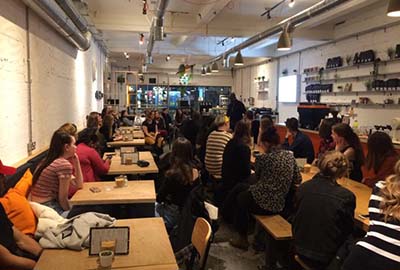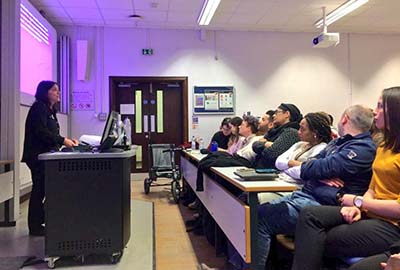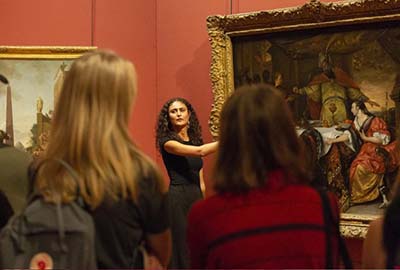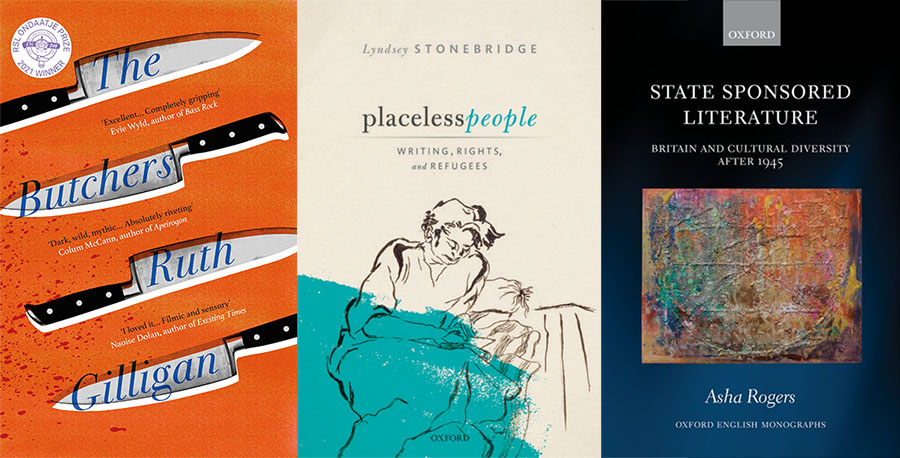
Contemporary Literature and Culture

Staff and students working in Contemporary Literature and Culture focus on literature, film, TV, theory, and popular culture from the late twentieth to early twenty-first century. We regularly host visiting speakers, public lectures, and conferences. We also organise symposia, reading groups, workshops, and other public events.
About us
About us
Based at the University of Birmingham, the Centre for Contemporary Literature and Culture (CCLC) was founded in 2015 as a home for staff and students working on mid-twentieth to early twenty-first-century literature, film, TV, theory, and popular culture. For the past decade, it has regularly hosted visiting speakers, public lectures, conferences, and symposia, as well as reading groups, workshops, and other public events. Past directors include Danielle Fuller, Zara Dinnen, Rachel Sykes and Amy Burge. In 2025, it became a research group directed by Asha Rogers.
Staff and students work on:
- creative criticism
- the contemporary novel
- literature and affect
- state sponsorship of British and global literatures
- the archives of Stuart Hall
- postcolonial theory and fiction
- sound in contemporary American fiction
- popular romance fiction
- the depiction of women in contemporary TV
- refugee writing, Islamophobia and anti-Muslim prejudice in the novel
- recent gender, queer, and disability theories
- literature and social movements and the value of the humanities.
We have a deliberately broad and inclusive view of ‘literature’ and ‘culture.’ We want to proudly showcase the lively and varied research on contemporary literatures and cultures in the School of English, Drama and Creative Studies and to be in relationship with the broader Birmingham area. We aim to connect with local artists and venues, hold our events on and off campus, showcase new projects and share creative and intellectual work.
We welcome all inquiries and applications for doctoral study and our events are open to all, regardless of academic record or experience. For information please contact the research group lead, Asha Rogers.
What kind of events do we run?

People and Pages, our biennial poetry night

The CCLC Annual lecture, previously given by Sara Ahmed, Testament, and Nikesh Shukla

Black History Month workshop: Unveiling Hidden Stories at the Barber Institute of Fine Art
Research
Research
We unite scholars interested in the production and experience of literature and related arts from the late twentieth to the early twenty-first centuries.

You can find a list of our current research projects and creative and critical publications below.
Affiliated projects
Stuart Hall Archive Project ‘Readings’ seminar
In January-June 2025 2025 we partnered with the Stuart Hall Archive Project to run a public seminar focused on Stuart Hall’s unpublished work and its meaning for our own times. The seminars were held monthly, off-campus at the Birmingham Race Impact Group Café in Digbeth, Birmingham. Researchers, students, teachers, activists, poets, artists, organisers gather to read a selection of works alongside guest discussants including Shahmima Akhtar, Gary Younge, Nirmal Puwar, Pat Noxolo, Zachary Myers, Malachi McIntosh and James Procter.
Creative criticism
A series of small in-house events centered on creative-criticism and its possibilities featuring critical provocations from Rachel Sykes, Bohdan Piasecki, Anna Metcalfe, and new creative work by Lyndsey Stonebridge, Rona Cran and Winnie Li.
Contemporary Studies Network
Contemporary Studies Network (CSN) provides a platform for discussion of emerging research and supports networking amongst scholars with an interest in contemporary literature, culture, politics, and critical theory. Organised by Dr Rachel Sykes (Birmingham), Dr Diletta De Cristofaro (Northumbria), and Dr Arin Keeble (Edinburgh Napier), CSN hold regular public engagement events.
Canons and values in Contemporary Literary Studies
Scholarship on the contemporary has a unique relationship to questions of canonicity and value. What values shape the choices made in research and teaching on the contemporary? What canons does this work produce? And how do these values and canons relate to those produced in education and the publishing and cultural industries? This series of workshops, held across 2019 – 2021, was organised by Contemporary Studies Network in collaboration with Kevin Brazil (University of Southampton) and Andrew Dean (UCL), and funded by the British Association for Contemporary Literary Studies (BACLS), the Leverhulme Trust, and the University of Southampton.
Muslim Women’s Popular Fiction AHRC Network (August 2021-July 2023)
Focusing on writing by women deemed ‘popular’ rather than ‘literary’, this network engages with under-studied popular and genre texts (including romance, chick-lit, comics, graphic novels, detective fiction, Young Adult, fantasy, autobiography, memoir, and science fiction) from a range of established critical disciplinary perspectives and across languages. Led by Dr Amy Burge.
Refugee Hosts
Professor Lyndsey Stonebridge co-leads this interdisciplinary and participatory research project supported by a Large PaCCS Grant (£800,000) awarded by the AHRC-ESRC through the Global Challenges Research Fund. This project aims to reframe debates about the roles and experiences of local communities and refugees in contexts of conflict-induced displacement in the global South, with a particular focus on displacement from Syria to neighbouring countries in the Middle East.
Sentimental Activism
Professor David James is currently working on a sequence of books revolving around the politics and poetics of affective forms in contemporary world Anglophone writing. You can watch his inaugural lecture on the topic here.
TMI: Sharing and Surveillance
This project reflects on how literature, culture, and new media can interrogate the effects of sharing and surveillance. We aim to provide a space to discuss intersectional ideas about the formation of identity and the digital, contemplating sharing and/or surveillance across a range of literatures, media platforms, and art forms. Led by Dr Rachel Sykes and Dr Dorothy Butchard.
Midlands Network of Popular Culture
An interdisciplinary group of students and researchers working within the sphere of popular culture. We aim to build an inclusive community throughout the Midlands whose areas of interest pertain, however broadly, to the study of popular culture, whether mainstream or alternative. Our Network hosts a variety of monthly events, ranging from seminar-style workshops to our Annual Forum.
Postgraduate study
Postgraduate study
Our staff deliver a range of postgraduate teaching and supervision in contemporary English and global literature, critical theory, and related cultural studies.
If you are thinking of applying for a PhD or MA by research, please consult our list of staff members and approach potential supervisors before submitting a formal application.
At the postgraduate taught level, our members contribute to the Popular Fiction and Twentieth and Twenty-First Century Literature Pathway on the MA Literature and Culture.
Staff researching contemporary literature and culture
Staff researching contemporary literature and culture
Dr Amy Burge - Associate Professor in Popular Fiction
My teaching and research interests are in popular fiction, in particular romance, both medieval and modern. My work is intersectional and focuses on gender, ethnicity and sexuality. I’m currently working on a literary history of romantic masculinity and a project exploring Arab and Muslim women’s genre fiction.
Dr Dorothy Butchard - Lecturer in Contemporary Literature & Digital Cultures
I teach and research contemporary and twentieth century literature, with particular interest in digital cultures and creative representations of technological change in the modern age.
Dr Rona Cran - Associate Professor in Twentieth-Century American Literature
Co-Director of the Centre for the Study of North America
My scholarship is interdisciplinary and centres on the literature and culture of New York City, queer writing, and modern American poetry.
Dr Isabel Galleymore - Senior Lecturer in Creative Writing
I am a poet and critic publishing on contemporary poetry, environmental writing and ecocriticism, with a focus on interdisciplinarity.
Professor Ruth Gilligan - Professor in Creative Writing
I am a bestselling author and journalist who joined the University of Birmingham in September 2014. I have published five novels to date, including most recently The Butchers which won the 2021 Royal Society of Literature Ondaatje Prize (awarded to the book that best evokes ‘the spirit of a place’).
Dr Dave Gunning - Reader in English Literature
I teach and research contemporary Anglophone literature and postcolonial studies.
Professor Alexandra Harris - Birmingham Professorial Fellow
I enjoy thinking and writing about British art and literature of all periods, especially in relation to landscape, locality and the presence of the past.
Dr Matt Hayler - Senior Lecturer in Contemporary Literature and Digital Cultures
I’m CO-I on the AHRC-funded Ambient Literature project and acted as a UK representative for the COST-funded European EREAD (evolution of reading in the age of digitisation) research network.
Professor David James - Chair in Modern and Contemporary Literature
My research and teaching areas span twentieth- and twenty-first-century writing, with a particular focus on the history and theory of the novel. Most recently, I’ve been working on the politics and poetics of affect in contemporary fiction and life-writing, combining my interests in the history of emotions, disability studies, and narrative medicine.
Professor Luke Kennard - Professor of Creative Writing
I am an award-winning poet, critic and writer of fiction, publishing on prose poetry and Absurdism in contemporary poetry.
Dr Winnie Li - Assistant Professor in Creative Writing
I am an award-winning novelist and media practitioner, specialising in feminist and ethnic diaspora approaches to writing, and the border of literary and ‘genre.’
Dr Anna Metcalfe - Senior Lecturer in Contemporary Writing
Anna Metcalfe is a short story writer and novelist. Her story collection, Blind Water Pass, includes the story 'Number Three', shortlisted for the Sunday Times Short Story Award. Her debut novel, Chrysalis, will be published in 2023.
Professor Peter Morey - Chair in 20th Century English Literature
I work on 20th century, contemporary and postcolonial literary studies, with particular reference to issues of cultural difference, narrative and power. I am the author and/or editor of numerous books, including Fictions of India: Narrative and Power (2000); Rohinton Mistry (2004); Framing Muslims: Stereotyping and Representation after 9/11 (2011), and Islamophobia and the Novel ...
Dr Bohdan Piasecki - Assistant Professor
I am a poet with a background in performance and interests in multilingualism/translation, site specific work, and hybrid storytelling.
Dr Rebecca Roach - Senior Lecturer in Contemporary Literature
My teaching and research focuses on 20th and 21st century literature and culture across the Anglophone world, with a particular emphasis on the relationship between literature, media and book history.
Dr Asha Rogers - Senior Lecturer in Contemporary Postcolonial Literature
I am a scholar of twentieth and twenty-first century literature. I research the culture-forming work of institutions as forces in literary history, and how writers have responded to their frequently peculiar demands.
Dr Fariha Shaikh - Associate Professor in Victorian Literature
My research focusses on the relationship between the British Empire and Victorian Literature, with specialist interests in migration, settler colonialism, memory and textual and material culture. I have further interests in decolonisation, museums, literature and the visual arts.
Professor Lyndsey Stonebridge - Interdisciplinary Chair of Humanities and Human Rights
My work focuses on twentieth-century and contemporary literature, political theory, and history, Human Rights, and Refugee Studies, drawing on the interdisciplinary connections between literature, history, politics, law, and social policy.
Dr Rachel Sykes - Associate Professor in Contemporary Literature and Culture
My research and teaching focus on memoir and contemporary life-writing, digital and popular cultures, and their intersections with gender and queer theory. I am currently working on a study of ‘confession’ under neoliberalism and write regularly on feminist politics in contemporary literature, TV, and pop music.
Dr Sara K Wood - Associate Professor in American Literature and Culture
My research focuses on twentieth-century African American literature and visual art, with a particular emphasis on the relationship between political and aesthetic ideas of freedom.